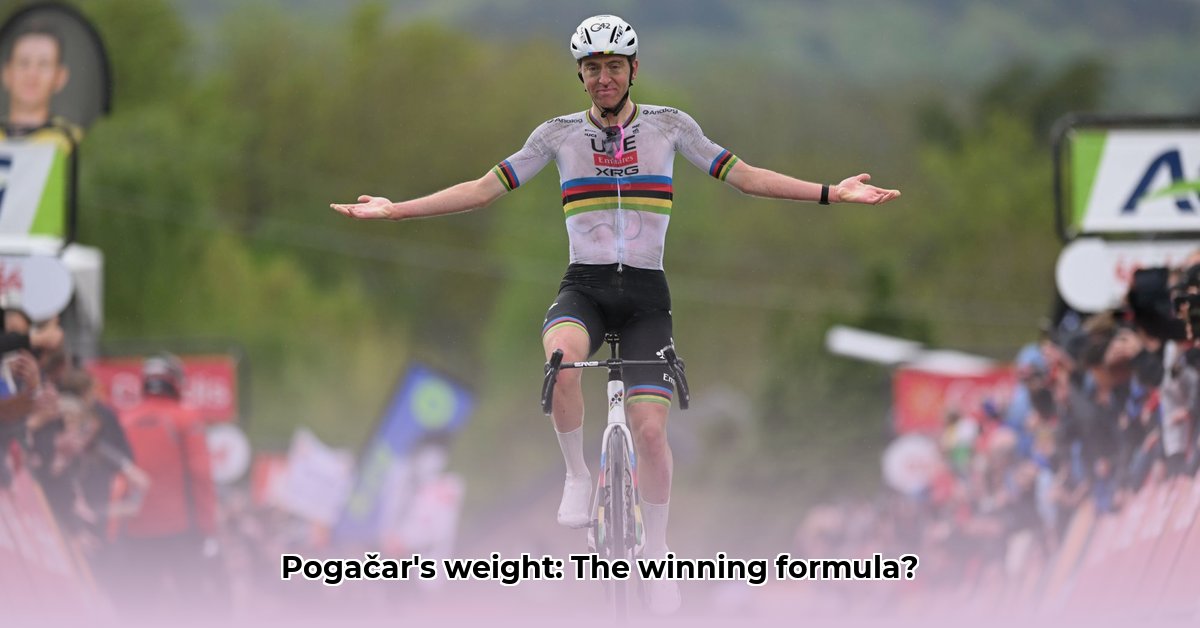
The Fine-Tuned Engine of a Cycling Champion
Right, so Tadej Pogačar. The man's a cycling phenomenon, né? Victories pile up like mountains, he seems to vlieg uphill, and even cleans up in time trials. But it’s not just natural talent; there's serious planning and strategy involved. It's not just leg power; it's the whole shebang – training, racing tactics, and even weight management for peak performance. We'll delve into what makes him tick, compare him to other top riders, and speculate on his future. Let's unpack the science and grit behind his incredible wins.
The Weight Game: Finding the Sweet Spot
Pro cycling is intensely precise. A fraction of a second separates victory from defeat. Tadej Pogačar's weight management is therefore critical to his success. It's not just a number; it's a key strategic element, constantly adjusted for peak performance. His body is a high-performance engine: too much weight hinders climbs, too little reduces power for sprints and time trials; finding the optimal power-to-weight ratio is key. While precise weight figures aren't publicly available for every race, analysing his results reveals a probable link between weight fluctuations and performance. Was he lighter during his Tour de France wins compared to the Giro d'Italia? A lower weight benefits mountain stages but could cost him power elsewhere.
Performance: A Story Told in Wins and Losses
Pogacar's race results clearly demonstrate a possible connection between performance and weight management. His victories across various Grand Tours and one-day races showcase incredible versatility. However, even champions have off days. Less successful races might indicate challenges in achieving perfect weight balance. The question isn't just what he weighs, but how his weight changes. Does he shed kilos before mountain stages, perhaps adding weight for flat stages and time trials? It's likely a combination of intense training, expert nutrition, and detailed preparation. His team uses data analysis to inform these decisions, arguably a crucial part of his success.
Did you know? A study published in the Journal of Strength and Conditioning Research showed a significant correlation between power-to-weight ratio and success in elite cycling.
The Team: A Well-Oiled Machine
Pogacar doesn't succeed alone; UAE Team Emirates plays a vital role. They provide logistical support, planned nutrition, and strategic race planning, all contributing to optimising his weight and performance. They're a highly skilled pit crew, constantly monitoring and tuning "the engine" – his body – for peak performance.
Comparing Strategies: Learning from the Best (and the Rest)
How does Pogacar's weight strategy compare to other top riders, like his former rival Primož Roglič? Both are exceptional climbers, but their approaches to weight management likely differ. Examining these differences provides insights into the complexities of optimal weight management in professional cycling.
The Future: Staying at the Top
Sustained top-level performance demands constant adaptation. How will Pogacar's weight strategy evolve as he ages? The natural aging process will likely influence his weight management needs. It will probably be a combination of continuous data analysis, careful planning, and the ongoing support of his team.
In short, understanding Tadej Pogacar's weight isn't just about a number. It's about the sophisticated strategies, meticulous planning, and the crucial support of his team that allows this exceptional cyclist to consistently dominate the sport. It's a compelling case study in human optimisation and athletic excellence.